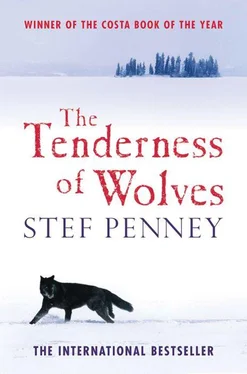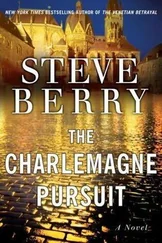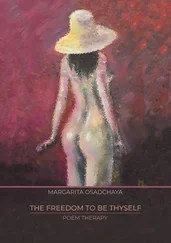‘But I cannot …’ He doesn’t know how to say it–he feels unqualified to look after anyone in this climate; not even himself, let alone a child. He lowers his voice. ‘I couldn’t take responsibility for him too. What if something happened? I can’t allow him to come.’ He feels hot with shame and uselessness.
Elizabeth says simply, ‘He is a man now.’
Donald looks at the boy, who lifts his eyes to his and nods. Donald can see nothing of Elizabeth in him; his skin is dark, the face flat, eyes almond-shaped under heavy lids. He must be like his father.
Later, when he is going back to his room to pack, Donald turns round again, and sees Elizabeth framed in her doorway, watching him.
‘Your father only wanted an answer. You do know that, don’t you? It wasn’t that he didn’t love you. It’s only human to want an answer.’
She stares at him, her eyes slitted by the setting sun out of a sky like polished steel. Stares at him but says nothing.
Something strange has happened to the weather. It is nearly Christmas, and yet, though we walk across frozen snow, the sky is as brilliant as a sunny day in July. Despite the scarf wrapped around my face, my eyes burn with the brightness of it. The dogs are delighted to be on the go again, and in some ways I can understand. Outside the palisade there is no treachery or confusion. There is only space and light; miles done and miles ahead. Things seem simple.
And yet they are not; it is only numbness that makes me think so.
When the sun goes down, I find out what my stupidity has led to. First I fall over one of the dogs, managing in the process to tear my skirt and set off a cacophony of barking. Then, having set down the pannikin of snow water, I cannot find it again. Quelling a flutter of fear I call Parker, who examines my eyes. Even without his telling me I know they are red and weeping. Flashes of red and purple cross my dull vision. There is a throbbing pain behind my eyes. I know I should have covered them on leaving yesterday, but I did not think of it; I was so happy to be going with him, and the wide white plain was so good to look at after the soiled surroundings of Hanover.
Parker makes a poultice of the tea-leaves wrapped in calico and cooled in snow, and makes me press it to my eyes. It is some relief, though not as good as a few drops of Perry Davis’s Painkiller. Perhaps it is as well we do not have any.
I think of Nesbit in the office, cornered and feral; how once that was me.
‘How far are we from this … place?’
It is habit that makes me lower the poultice; impolite not to look at someone when you are talking to them.
‘Keep it on,’ he says. And when I have replaced it, ‘We will get there the day after tomorrow.’
‘And what is there?’
‘A lake, with a cabin.’
‘What is its name?’
‘It has no name that I know.’
‘And why there?’
Parker hesitates for a long minute, so that I peer at him from behind the poultice. He is staring into the distance and doesn’t seem to notice. ‘Because that is where the furs are.’
‘The furs? You mean the Norwegians’ furs?’
‘Yes.’
Now I drop the poultice and look at him in earnest. ‘Why do you want to lead him to them? That is exactly what he wants!’
‘That is why we are doing it. Keep it on.’
‘Couldn’t we … pretend they are somewhere else?’
‘I think he already knows where they are. If we went in another direction I don’t think he would follow. He came this way before–he and Nepapanees.’
I think about what this means: Nepapanees, who did not come back, so must be there still. And fear steals through me, creeping into my bone marrow, making itself at home. It is easy to hide my reaction behind the sodden poultice; not so easy to pretend I am brave enough for this.
‘This way, when he comes, it will be sure.’
And then what? I think, but don’t dare say out loud. Another voice in my head–the annoying one–says, You could have stayed behind. You’ve made your bed. Now lie in it.
Then, after another pause, Parker says, ‘Open your mouth.’
‘I beg your pardon?’ Can he read my mind? Shame rushes through me, just about obliterating the fear.
‘Open your mouth.’ His voice is lighter now, amused at something. I open it a little way, feeling childish. Something angular and hard meets my lips, forcing them wider, and into my mouth slips a jagged piece of what feels like lake ice–flat and deliquescent. His thumb or forefinger brushes against my lips, rough as glasspaper. Or perhaps it is his glove.
I close my mouth around the object and as it warms and melts, it explodes with dark, smoky sweetness, causing a dizzying rush of water to my mouth. I am smiling: maple sugar. Where he got such a thing I have no idea.
‘Good?’ he asks, and from his voice I can tell he is smiling too. I tilt my head to one side as if considering my answer.
‘Hm.’ I say lightly, still secure behind the poultice. It makes me reckless. ‘Is this supposed to make my eyes better?’
‘No. It is supposed to taste good.’
I take a deep breath–scented with autumnal smoke and sweetness, an undertow of bitter char. ‘I am afraid.’
‘I know.’
I wait behind my mask for Parker’s soothing words of reassurance. He is thinking about them, choosing them carefully, it seems.
They don’t come.
There are five volunteers in the Search Party: Mackinley; a native guide, Sammy; a local youth called Matthew Fox, intent on proving his backwoods worth; Ross, the man with the missing son and wife; and Thomas Sturrock, ex-searcher. Of all of them, Sturrock is aware that he is there on sufferance; to the rest he must seem an old man, and no one is quite sure what he is doing in Caulfield anyway. It was only his considerable charm that bought his place on the party; that and a long evening buttering up the fox-faced Mackinley and reminding him of his past triumphs. He even talked up his tracking skills, but fortunately Sammy has had no need of help; in the pristine dazzle of the new snow, Sturrock has no idea whether they are following previous tracks or not. But he is here, every step taking him closer to Francis Ross and the object of his journey.
Since Maria Knox came back from the Sault with her extraordinary account of meeting Kahon’wes, he has been fired with an excitement he thought he had lost for ever. In his mind he has turned it over many times–could Kahon’wes have known that he was behind it? Could the names he said have been pure coincidence? Impossible. He has decided that the tablet is written in an Iroquoian language and records the confederacy of the Five Nations. Who knows, it might even have been written at the time. Whether it was or not, the greater implications are not lost on him: the effect such a discovery would have on Indian policy; the embarrassment it would cause the governments above and below the border; the weight it would lend to native calls for autonomy. What man does not long to do good, and profit by the doing at the same time?
Those were his thoughts for the first couple of hours. Then he started to think–because he is nothing if not a pragmatist–of the possibility that Maria was right, and the thing is a clever fake. In the deepest recesses of his mind he knows it will make no difference. He will persuade Kahon’wes to back him up; that shouldn’t be difficult. If he presents the thing with enough conviction and cleverness (no problem there), the initial splash will make his name, and any subsequent controversy can only be good publicity. As for the matter of not knowing where the tablet is, he refuses to let it worry him. He is confident that Francis Ross did take it, and that as soon as they catch up with him, he will be able to talk it into his own hands. He has rehearsed the lines he will use, many times …
Читать дальше












